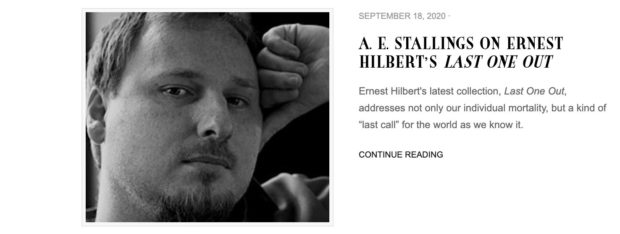The September 2020 issue of B O D Y Magazine features a review of Ernest Hilbert’s latest book, Last One Out, by A. E. Stallings:
Ernest Hilbert is not an optimist.In his latest collection, Last One Out, the title poem addresses not only our individual mortality, but a kind of “last call,” a “hurry up please it’s time” for the world as we know it:
One day, the last host will slam the last door,
The last smoked ash will settle on the floor,
And he’ll look up, and stop, maybe toast
Himself, with the slow, confused motions of a ghost.
Nor is he a pessimist; the pessimist, expecting the worst, puts himself in the position of being sometimes pleasantly surprised. Rather, I think, Hilbert is a pejorist—things are going to get worse rather than better. It is a clear-eyed stance that nonetheless allows for some wonder at things as they are, some wry humor, some bonhomie. One day it will all be over, but even on that day, there will be hosting and toasting as well as ghosting. Last One Out is imbued with this feeling of belatedness, and serves both as a kind of middle of the journey reckoning and overview of career and ambition, but also a new starting out. The book’s epigraph is a tag out of Horace: Non Omnis Moriar—I shall not die altogether; something will remain. Is there possibly a glimmer of hope in this? With the title, Last One Out, perhaps it sets up an unresolved dissonance.
To give you an idea of Hilbert’s black-bile humor, his Eeyoric temper (or Yorick, perhaps), the title of his previous collection, Caligulan, is a word of his own coinage. Hilbert goes on for two pages giving a full dictionary entry for his newly minted adjective, a condition that denotes, among other things, “an abnormal and overwhelming sense of apprehension, marked by physiological signs … by doubts concerning the reality and the nature of an unspecified threat, and by self-doubt about one’s capacity to address it” or “an inclination to use threats and the menace of violence to keep a person or group of people in a state of intimidation and unease” and “a sense that something is very, very wrong.”
It’s eerie now, rereading these definitions, at how this speaks so specifically to the moment. Even eerier, though is the final sentence of the entry: First known use 2015, USA (emphasis, mine). The book, seemingly a product of the Zeitgeist, was in fact arguably prophecy of 2016 and beyond.



1 Comment
“on the outskirts of both highway robbery and scholarship” – Ha! Great review of your great work, Ernie.